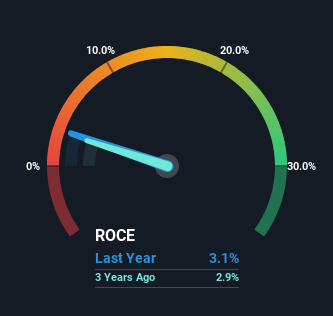Hanshin Diesel Works' (TSE:6018) Returns On Capital Not Reflecting Well On The Business

If you're looking at a mature business that's past the growth phase, what are some of the underlying trends that pop up? When we see a declining return on capital employed (ROCE) in conjunction with a declining base of capital employed, that's often how a mature business shows signs of aging. Basically the company is earning less on its investments and it is also reducing its total assets. So after we looked into Hanshin Diesel Works (TSE:6018), the trends above didn't look too great.
What Is Return On Capital Employed (ROCE)?
Just to clarify if you're unsure, ROCE is a metric for evaluating how much pre-tax income (in percentage terms) a company earns on the capital invested in its business. The formula for this calculation on Hanshin Diesel Works is:
Return on Capital Employed = Earnings Before Interest and Tax (EBIT) ÷ (Total Assets - Current Liabilities)
0.031 = JP¥551m ÷ (JP¥23b - JP¥5.1b) (Based on the trailing twelve months to March 2024).
Therefore, Hanshin Diesel Works has an ROCE of 3.1%. Ultimately, that's a low return and it under-performs the Machinery industry average of 8.0%.
View our latest analysis for Hanshin Diesel Works

Historical performance is a great place to start when researching a stock so above you can see the gauge for Hanshin Diesel Works' ROCE against it's prior returns. If you'd like to look at how Hanshin Diesel Works has performed in the past in other metrics, you can view this free graph of Hanshin Diesel Works' past earnings, revenue and cash flow.
What Can We Tell From Hanshin Diesel Works' ROCE Trend?
There is reason to be cautious about Hanshin Diesel Works, given the returns are trending downwards. About five years ago, returns on capital were 5.1%, however they're now substantially lower than that as we saw above. On top of that, it's worth noting that the amount of capital employed within the business has remained relatively steady. Since returns are falling and the business has the same amount of assets employed, this can suggest it's a mature business that hasn't had much growth in the last five years. If these trends continue, we wouldn't expect Hanshin Diesel Works to turn into a multi-bagger.
What We Can Learn From Hanshin Diesel Works' ROCE
In the end, the trend of lower returns on the same amount of capital isn't typically an indication that we're looking at a growth stock. Despite the concerning underlying trends, the stock has actually gained 31% over the last five years, so it might be that the investors are expecting the trends to reverse. Regardless, we don't like the trends as they are and if they persist, we think you might find better investments elsewhere.
Hanshin Diesel Works does come with some risks though, we found 3 warning signs in our investment analysis, and 2 of those don't sit too well with us...
If you want to search for solid companies with great earnings, check out this free list of companies with good balance sheets and impressive returns on equity.
If you're looking to trade Hanshin Diesel Works, open an account with the lowest-cost platform trusted by professionals, Interactive Brokers.
With clients in over 200 countries and territories, and access to 160 markets, IBKR lets you trade stocks, options, futures, forex, bonds and funds from a single integrated account.
Enjoy no hidden fees, no account minimums, and FX conversion rates as low as 0.03%, far better than what most brokers offer.
Sponsored ContentValuation is complex, but we're here to simplify it.
Discover if Hanshin Diesel Works might be undervalued or overvalued with our detailed analysis, featuring fair value estimates, potential risks, dividends, insider trades, and its financial condition.
Access Free AnalysisHave feedback on this article? Concerned about the content? Get in touch with us directly. Alternatively, email editorial-team (at) simplywallst.com.
This article by Simply Wall St is general in nature. We provide commentary based on historical data and analyst forecasts only using an unbiased methodology and our articles are not intended to be financial advice. It does not constitute a recommendation to buy or sell any stock, and does not take account of your objectives, or your financial situation. We aim to bring you long-term focused analysis driven by fundamental data. Note that our analysis may not factor in the latest price-sensitive company announcements or qualitative material. Simply Wall St has no position in any stocks mentioned.
Have feedback on this article? Concerned about the content? Get in touch with us directly. Alternatively, email editorial-team@simplywallst.com
About TSE:6018
Hanshin Diesel Works
Manufactures and sells engines and propulsion systems for ships worldwide.
Flawless balance sheet with acceptable track record.
Market Insights
Community Narratives




